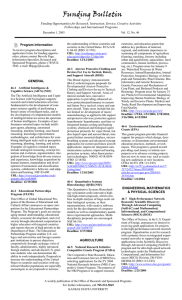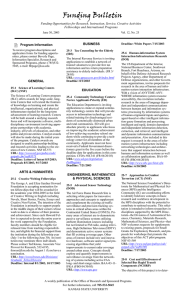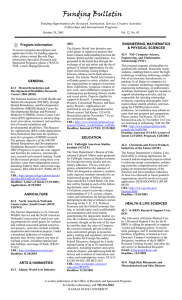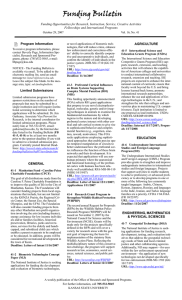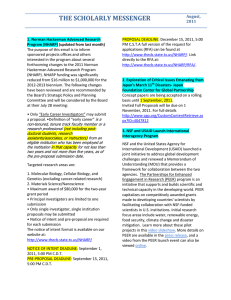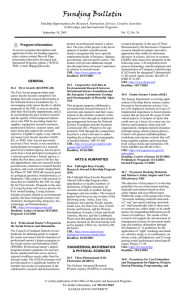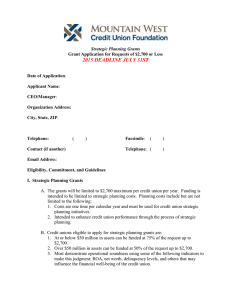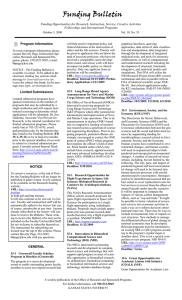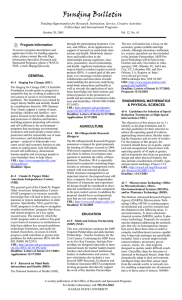Funding Opportunities for Research, Instruction, Service, Creative Activities
advertisement
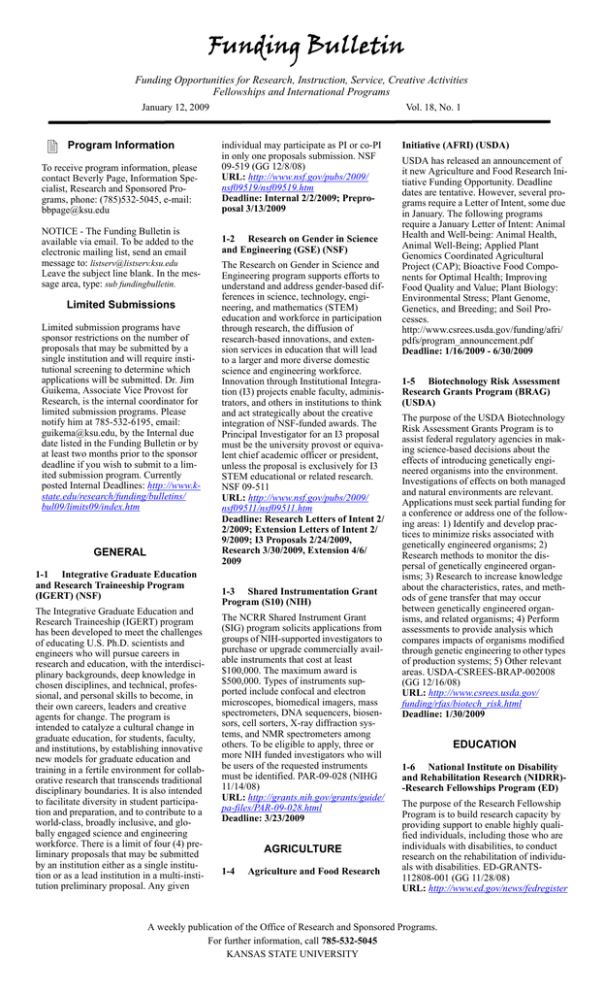
Funding Bulletin Funding Opportunities for Research, Instruction, Service, Creative Activities Fellowships and International Programs January 12, 2009 Program Information To receive program information, please contact Beverly Page, Information Specialist, Research and Sponsored Programs, phone: (785)532-5045, e-mail: bbpage@ksu.edu NOTICE - The Funding Bulletin is available via email. To be added to the electronic mailing list, send an email message to: listserv@listserv.ksu.edu Leave the subject line blank. In the message area, type: sub fundingbulletin. Limited Submissions Limited submission programs have sponsor restrictions on the number of proposals that may be submitted by a single institution and will require institutional screening to determine which applications will be submitted. Dr. Jim Guikema, Associate Vice Provost for Research, is the internal coordinator for limited submission programs. Please notify him at 785-532-6195, email: guikema@ksu.edu, by the Internal due date listed in the Funding Bulletin or by at least two months prior to the sponsor deadline if you wish to submit to a limited submission program. Currently posted Internal Deadlines: http://www.kstate.edu/research/funding/bulletins/ bul09/limits09/index.htm GENERAL 1-1 Integrative Graduate Education and Research Traineeship Program (IGERT) (NSF) The Integrative Graduate Education and Research Traineeship (IGERT) program has been developed to meet the challenges of educating U.S. Ph.D. scientists and engineers who will pursue careers in research and education, with the interdisciplinary backgrounds, deep knowledge in chosen disciplines, and technical, professional, and personal skills to become, in their own careers, leaders and creative agents for change. The program is intended to catalyze a cultural change in graduate education, for students, faculty, and institutions, by establishing innovative new models for graduate education and training in a fertile environment for collaborative research that transcends traditional disciplinary boundaries. It is also intended to facilitate diversity in student participation and preparation, and to contribute to a world-class, broadly inclusive, and globally engaged science and engineering workforce. There is a limit of four (4) preliminary proposals that may be submitted by an institution either as a single institution or as a lead institution in a multi-institution preliminary proposal. Any given Vol. 18, No. 1 individual may participate as PI or co-PI in only one proposals submission. NSF 09-519 (GG 12/8/08) URL: http://www.nsf.gov/pubs/2009/ nsf09519/nsf09519.htm Deadline: Internal 2/2/2009; Preproposal 3/13/2009 1-2 Research on Gender in Science and Engineering (GSE) (NSF) The Research on Gender in Science and Engineering program supports efforts to understand and address gender-based differences in science, technology, engineering, and mathematics (STEM) education and workforce in participation through research, the diffusion of research-based innovations, and extension services in education that will lead to a larger and more diverse domestic science and engineering workforce. Innovation through Institutional Integration (I3) projects enable faculty, administrators, and others in institutions to think and act strategically about the creative integration of NSF-funded awards. The Principal Investigator for an I3 proposal must be the university provost or equivalent chief academic officer or president, unless the proposal is exclusively for I3 STEM educational or related research. NSF 09-511 URL: http://www.nsf.gov/pubs/2009/ nsf09511/nsf09511.htm Deadline: Research Letters of Intent 2/ 2/2009; Extension Letters of Intent 2/ 9/2009; I3 Proposals 2/24/2009, Research 3/30/2009, Extension 4/6/ 2009 1-3 Shared Instrumentation Grant Program (S10) (NIH) The NCRR Shared Instrument Grant (SIG) program solicits applications from groups of NIH-supported investigators to purchase or upgrade commercially available instruments that cost at least $100,000. The maximum award is $500,000. Types of instruments supported include confocal and electron microscopes, biomedical imagers, mass spectrometers, DNA sequencers, biosensors, cell sorters, X-ray diffraction systems, and NMR spectrometers among others. To be eligible to apply, three or more NIH funded investigators who will be users of the requested instruments must be identified. PAR-09-028 (NIHG 11/14/08) URL: http://grants.nih.gov/grants/guide/ pa-files/PAR-09-028.html Deadline: 3/23/2009 AGRICULTURE 1-4 Agriculture and Food Research Initiative (AFRI) (USDA) USDA has released an announcement of it new Agriculture and Food Research Initiative Funding Opportunity. Deadline dates are tentative. However, several programs require a Letter of Intent, some due in January. The following programs require a January Letter of Intent: Animal Health and Well-being: Animal Health, Animal Well-Being; Applied Plant Genomics Coordinated Agricultural Project (CAP); Bioactive Food Components for Optimal Health; Improving Food Quality and Value; Plant Biology: Environmental Stress; Plant Genome, Genetics, and Breeding; and Soil Processes. http://www.csrees.usda.gov/funding/afri/ pdfs/program_announcement.pdf Deadline: 1/16/2009 - 6/30/2009 1-5 Biotechnology Risk Assessment Research Grants Program (BRAG) (USDA) The purpose of the USDA Biotechnology Risk Assessment Grants Program is to assist federal regulatory agencies in making science-based decisions about the effects of introducing genetically engineered organisms into the environment. Investigations of effects on both managed and natural environments are relevant. Applications must seek partial funding for a conference or address one of the following areas: 1) Identify and develop practices to minimize risks associated with genetically engineered organisms; 2) Research methods to monitor the dispersal of genetically engineered organisms; 3) Research to increase knowledge about the characteristics, rates, and methods of gene transfer that may occur between genetically engineered organisms, and related organisms; 4) Perform assessments to provide analysis which compares impacts of organisms modified through genetic engineering to other types of production systems; 5) Other relevant areas. USDA-CSREES-BRAP-002008 (GG 12/16/08) URL: http://www.csrees.usda.gov/ funding/rfas/biotech_risk.html Deadline: 1/30/2009 EDUCATION 1-6 National Institute on Disability and Rehabilitation Research (NIDRR)-Research Fellowships Program (ED) The purpose of the Research Fellowship Program is to build research capacity by providing support to enable highly qualified individuals, including those who are individuals with disabilities, to conduct research on the rehabilitation of individuals with disabilities. ED-GRANTS112808-001 (GG 11/28/08) URL: http://www.ed.gov/news/fedregister A weekly publication of the Office of Research and Sponsored Programs. For further information, call 785-532-5045 KANSAS STATE UNIVERSITY Deadline: 1/27/2009 ENGINEERING 1-7 Young Faculty Award (DARPA) The DARPA Young Faculty Award (YFA) program will identify and engage rising research stars in junior faculty positions in academia and expose them to Department of Defense needs and DARPA’s program development process. This Research Announcement solicits single investigator proposals for research and development in the areas of the Physical Sciences, Engineering and Mathematics of interest to DARPA’s Microsystems Technology Office (MTO) and Defense Sciences Office (DSO). DARPA-RA-09-14 (GG 12/18/08) URL: http://www.grants.gov/ Deadline: 2/16/2009 1-8 Innovations in Engineering Education, Curriculum, and Infrastructure (IEECI) (NSF) The Innovations in Engineering Education, Curriculum, and Infrastructure (IEECI) program supports research which addresses four aspects of engineering education: 1) how students best learn the ideas, principles, and practices to become creative and innovative engineers, and how this learning is measured; 2) how application of cyberlearning resources of networked computing and communication, interactive visualization capabilities, and well designed user interfaces can be used to develop easily transportable tools and systems with low barriers to adoption which significantly improve learning; 3) integration of sustainability into engineering education; and 4) future directions of U.S. engineering doctoral programs. NSF 08-610 URL: http://www.nsf.gov/pubs/2008/ nsf08610/nsf08610.htm Deadline: 3/11/2009 1-9 NRC Faculty Development Grant (DOE) The U.S. Nuclear Regulatory Commission Faculty Development Grants Program recognizes the need to attract, recruit or retain highly-qualified individuals in academic teaching careers. Funding under this announcement is intended to support faculty in the nuclear-related fields of Nuclear Engineering, Health Physics, Radiochemistry and related disciplines. The grants specifically target probationary, tenure-track faculty in these academic areas during the first 6 years of their career. HR-FN-1208-NED02 (GG 12/23/08) URL: http://www/grants.gov Deadline: 2/25/2009 1-10 Small Research Grants, Fellowships and Scholarships (KSU/ NASA) The KSU NASA Space Grant Consortium is announcing a call for proposals for its Small Research Grant program and appli- cations for its Undergraduate Scholarship and Graduate Fellowship programs. Small Research Grants are intended to be used to assist in the support of student salary, materials/supplies, and travel on projects directly related to NASA Mission Directorates and/or to the NASA Education Mission. Undergraduate Student Scholarships support students working in Science, Technology, Engineering, and Mathematics. The scholarships are generally intended to be used toward a portion of the student’s academic-related activities at KSU, professional/educational activities, or the student’s internships at NASA facilities. Graduate Student Fellowships support students working in Science, Technology, Engineering, and Mathematics disciplines. Contact Dr. Kevin Lease, Graduate School, for more information (lease@ksu.edu). Deadline: Small Research Grants 2/9/ 2009 and stalking, and modified the eligibility criteria as well as the statutory purpose areas under which projects must be implemented. The Rural Program recognizes that child, youth and adult victims of domestic violence, dating violence, sexual assault and stalking living in rural jurisdictions face unique barriers to receiving assistance and additional challenges rarely encountered in urban areas. In addition, socio-cultural, economic, and geographic barriers create difficulties for victim service providers and other social services professionals to identify and assist victims of these crimes. The primary purpose of the Rural Program is to enhance the safety of child, youth and adult victims of domestic violence, dating violence, sexual assault, and stalking by supporting projects uniquely designed to address and prevent these crimes in rural jurisdictions. OVW-2009-2001 (GG 12/ 10/08) URL: http://www07.grants.gov Deadline: 2/11/2009 1-11 Environmental Remediation Science Program (DOE) The Office of Science, U.S. Department of Energy, announces its interest in receiving applications for research grants in the Environmental Remediation Sciences Program (ERSP). The ERSP seeks to advance fundamental science to understand, predict and mitigate the impacts of environmental contamination from past nuclear weapons production and provide a scientific basis for the long term stewardship of nuclear waste disposal. The program supports an integrated portfolio of research ranging from molecular to field scales with emphasis on the use of advanced computer models and multidisciplinary, iterative experimentation to understand and predict contaminant transport in complex subsurface environments. DE-PS02-09ER09-07 (GG 12/24/08) URL: http:/www.grants.gov Deadline: Letters of Intent 1/30/2009; Applications 4/9/2009 1-14 Science, Technology, and Society (STS) (NSF) STS considers proposals that examine historical, philosophical, and sociological questions that arise in connection with science, engineering, and technology, and their respective interactions with society. STS has four components: 1) Ethics and Values in Science, Engineering and Technology (EVS); 2) History and Philosophy of Science, Engineering and Technology (HPS); 3) Social Studies of Science, Engineering and Technology (SSS); 4) Studies of Policy, Science, Engineering and Technology (SPS). NSF 08-553 (GG 11/28/08) URL: http://www.nsf.gov/pubs/2008/ nsf08553/nsf08553.htm Deadline: 2/1/2009, 8/1/2009 SOCIAL SCIENCES 1-12 Competition to Prevent HighRisk Drinking or Violent Behavior Among College Students (ED) The Grant Competition to Prevent HighRisk Drinking or Violent Behavior Among College Students provides awards to develop or enhance, implement, and evaluate campus-and/or communitybased strategies to prevent high-risk drinking or violent behavior among college students. (FR 12/15/08) URL: http://www.ed.gov/news/fedregister Deadline: 1/30/2009 R.W. Trewyn, Vice President for Research Jim Guikema, Associate Vice President for Research Caron Boyce, Administrative Specialist Preaward Section Paul Lowe, Director Anita Fahrny, Assistant Director Kathy Tilley, Rich Doan, Carmen Garcia, Danielle Brunner, Rex Goff, Adassa Roe, Sharon Zoeller Funding Information Specialist & Editor Beverly Page Development Director 1-13 Rural Domestic Violence, Dating Violence, Sexual Assault, and Stalking Assistance Program (DOJ) The Violence Against Women and Department of Justice Reauthorization Act of 2005 expanded the scope of the Rural Domestic Violence, Dating Violence, Sexual Assault and Stalking Assistance Program to include sexual assault Mary Lou Marino Human Subjects, Animal Care & Use, and Biosafety Gerald P. Jaax, Associate Vice President, Research Compliance Heath Ritter, Compliance Monitor Adrian Self, Administrative Specialist Congressional Relations Sue Peterson, R.W. Trewyn A weekly publication of the Office of Research and Sponsored Programs. For further information, call 785-532-5045 KANSAS STATE UNIVERSITY
